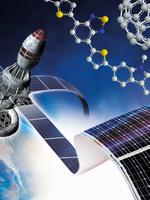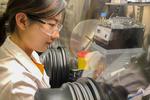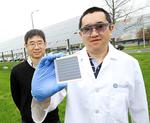Other
“A promising semiconductor material could be improved if flaws previously thought irrelevant to performance are reduced, according to research published today in Nature Communications. A group of researchers at Rensselaer Polytechnic Institute and other universities has shown that a specific …

“Made with ‘Jenga chemistry,’ the discovery could help crack the mystery of how high-temperature superconductors work. Menlo Park, Calif. — Scientists at the Department of Energy’s SLAC National Accelerator Laboratory and Stanford University have made the first nickel oxide material …

“· Patterning metals for electronics and solar cells can be slow, expensive and involve toxic chemicals · Scientists from the Department of Chemistry at the University of Warwick have developed a way to make patterned films of silver and copper (the two …

“Advances in organic phosphorescent materials are opening new opportunities for organic light-emitting diodes for combined electronics and light applications, including solar cells, photodiodes, optical fibers and lasers. While low-dimensional luminescent materials, like the calcium titanium oxide mineral perovskite, have promising …

“Engineers at Washington University have developed what they believe is a more stable, less toxic semiconductor for solar applications using a novel double perovskite oxide. Rohan Mishra, assistant professor of mechanical engineering & materials science in the McKelvey School of Engineering …
“A new class of 2D perovskite materials with edges that are conductive like metals and cores that are insulating was found by researchers who said these unique properties have applications in solar cells and nanoelectronics. “This observation of the metal-like …

“Scientists from the Skoltech Center for Energy Science and Technology, the Institute for Problems of Chemical Physics of RAS, and the Department of Chemistry of MSU recently presented solar cells based on conjugated polymers and fullerene derivatives that demonstrated record-high …

“Researchers at EPFL bring diurnal and seasonal variations into the lab to test the performance of perovskite solar cells under realistic conditions. The findings are published in Nature Energy. It was only ten years ago that metal-halide perovskites were discovered …

“U of T Engineering researchers have combined two emerging technologies for next-generation solar power — and discovered that each one helps stabilize the other. The resulting hybrid material is a major step toward reducing the cost of solar power while multiplying …

“The most affordable, efficient way to harness the cleanest, most abundant renewable energy source in the world is one step closer to reality. The University of Toledo physicist pushing the performance of solar cells to levels never before reached made …
